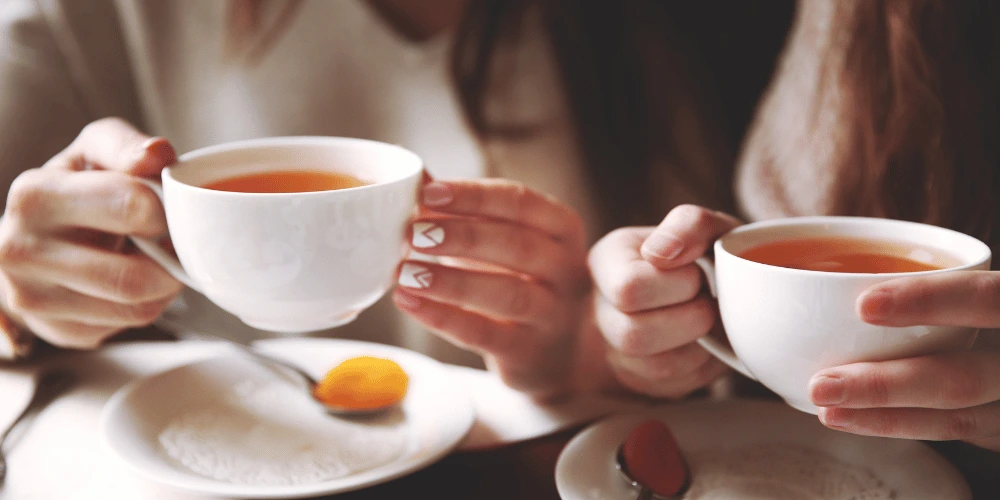Morning Tea Culture in Britain: Study Shows 53M Daily Cups and Why It Matters
Anúncios
Scale of British Tea Consumption
Tea is more than just a beverage in Britain; it’s a ritualistic part of daily life.
Each morning, collectively, Brits enjoy a staggering 53 million cups of tea.
Anúncios
This sheer volume emphasizes the deep-rooted cultural significance and routine aspect of tea drinking.
Early Morning Tea Drinkers
It’s interesting to note that among those 53 million cups, 12% of Brits reach for their first cup of tea immediately upon waking.
Anúncios
This highlights the immediate need for that familiar and comforting warmth to kick-start the day.
For these individuals, the sound of a boiling kettle is the first thing heard each morning.
Multiple Cups to Begin the Day
Furthermore, tea enthusiasts show an impressive level of commitment with 10% of Brits consuming three or more cups just to start their day. This isn’t just about enjoying a drink; it’s a ritual somehow related to waking up the senses.
The steaming cup of tea is akin to fuel that powers them through the initial hours of the day.

Collective Impact
Consuming an average morning cup of tea might seem like a small act, but collectively, the British tea routine amasses to an enormous scale – amounting to approximately 2,682 million gallons each year.
This statistic showcases the vastness and uniformity of tea culture across the country.
This cultural priority isn’t just a matter of habit, but a significant aspect of daily life that sets the stage for a productive day.
Many Brits express relying on their morning tea to feel alert and ready to tackle the day’s challenges.
Whether it’s the immediate boost, the psychological comfort, or the habit itself, tea remains an irreplaceable part of the British morning.
Moving forward, we’ll delve into the specific habits and timing associated with morning tea consumption, shedding light on when and how Brits make their cherished first cuppa of the day.
Morning Tea Habits and Timing
One fascinating aspect of British tea culture is the precise timing of tea consumption.
On average, the first cup of tea is enjoyed at 7:30 AM, marking the true start of the day for many Brits.
The ritual of the morning cup is so ingrained that nearly half (48%) of the population insists on having their daily tea fix before 9 AM.
This early start signifies the importance of tea as a fundamental part of the morning routine.
Prime Time for Tea
While some might argue the best time for the first sip, the study clearly shows a collective preference to beat the morning rush with a calming cup before 9 AM.
Interestingly, a noticeable portion of tea enthusiasts prioritize their brew relatively early, making tea a cornerstone of their pre-work ritual.
Savoring Every Moment
Brits don’t just gulp their tea; they spend nearly nine minutes savoring each cup.
This unhurried approach to tea drinking emphasizes its cultural prominence.
The nine minutes spent each morning isn’t just about nourishment; it’s about taking a moment to breathe, collect thoughts, and prepare for the tasks ahead.
Cultural Insight:
- 59% make it a point to sip tea slowly, enjoying the flavor and the quiet moment it provides.
The Daily Tea Experience
This collective dedication reveals the ceremonial aspect of tea drinking in Britain.
It’s both a personal pause and a societal norm, transcending the mere act of hydration.
Whether it’s the daily indulgence before 9 AM or the nearly ten-minute savoring sessions, tea isn’t just a drink—it’s a cherished experience.
The next aspect of British tea culture we’ll delve into is the varied preferences in tea types and how builder’s tea has captured the hearts of the majority.
Tea Preferences and Types
When it comes to tea preferences in Britain, there’s a definitive hierarchy.
The survey conducted highlights some clear favorites among the types of tea consumed each morning.
Builder’s Tea: The Unrivaled Favorite
Leading the pack is Builder’s tea, cherished by 52% of those surveyed.
This robust, no-nonsense option is often characterized by its strong brew, typically topped with a splash of milk and occasionally sweetened.
Its popularity is likely due to its ability to provide a hearty, comforting, and invigorating start to the day.
This type of tea is synonymous with British culture and is reminiscent of a traditional morning boost that many find indispensable.
Black Tea: The Classic Choice
Following Builder’s tea, black tea claims the second spot, being preferred by 16% of British tea drinkers.
Revered for its rich flavor and versatility, black tea can be enjoyed plain, with milk, or with lemon.
Its prevalence in British kitchens can be traced back to historical trade routes and colonial influences, making it a mainstay in modern tea-drinking habits.
Black tea’s adaptability and wide range of varieties—from Earl Grey to English Breakfast—ensure that it caters to diverse palates.
Green Tea: The Health-Conscious Selection
Rounding out the top three is green tea, which appeals to 10% of respondents.
Known for its lighter flavor and numerous health benefits, green tea is often the go-to for those seeking an alternative to the stronger flavors of Builder’s and black teas.
Rich in antioxidants, this tea is praised for its potential health benefits, including improved brain function and fat burning properties.
Despite its lower ranking, green tea has carved out a niche among the health-conscious segment of the British tea-drinking population.
These preferences shed light on the diverse tastes and the rich tapestry of tea culture in Britain, reflecting both traditional and modern influences.
As seen from the survey, whether it’s the strong and hearty Builder’s tea, the classic black tea, or the lighter green tea, Britain’s morning tea ritual remains a cherished tradition embraced by many.
Shifting our focus next, let’s delve into the psychological and productivity benefits that this cherished morning ritual provides.
Psychological and Productivity Benefits
The morning tea ritual in Britain is more than just a cultural cornerstone; it is significantly tied to productivity and psychological well-being.
According to a survey, a refreshing cup of tea plays a vital role in kick-starting the day for many Brits, with a substantial 64% attributing their use of tea to an increase in productivity.
It’s not uncommon to hear people credit their morning tea for helping them tackle their daily tasks more efficiently, reinforcing tea’s role as an essential productivity booster.
The Morning Boost
For the majority of tea enthusiasts, the benefits begin almost immediately.
A remarkable 78% report that their morning cup provides a much-needed boost to start their day.
This morning ritual is more than a routine; it’s an invigorating experience that helps transition from the haze of sleep to the clarity needed for a productive day.
The aroma, warmth, and taste all contribute to this mood-lifting effect, offering a familiar comfort that helps awaken the senses.
Tea as a Reset Button
But the benefits of tea extend beyond the morning hours.
As the day progresses, 41% of individuals turn to tea as a reset button.
Whether it’s a mid-morning break or an afternoon respite, tea offers a moment to pause, reflect, and recharge.
This practice not only aids in maintaining productivity but also supports mental well-being by providing a brief escape from the stresses of daily tasks.
The simple act of preparing and enjoying a cup can serve as a mindful ritual, promoting relaxation and mental clarity.
Social and Physical Comfort
Tea also serves as a pillar of social and physical comfort.
Shared tea breaks can foster connections and build camaraderie among colleagues, further enhancing a supportive and productive work environment.
The ritualistic aspect of tea drinking, where every step from boiling the kettle to sipping the final drop is savored, adds an element of mindfulness that contributes to overall mental wellness.
The role of tea in the daily lives of Brits extends far beyond mere consumption; it’s a deeply ingrained part of the cultural fabric, impacting productivity and psychological well-being in profound ways.
As we explore further into the varied tastes and preferences of tea drinkers, we continue to unearth the reasons behind this beloved tradition’s enduring popularity.
Cultural Priority and Impact
In Britain, the morning tea ritual is more than just a habit; it’s an essential part of daily life.
A significant 59% of Brits say they can’t start their day without tea, making it the cornerstone of their morning routine.
This need is so prevalent that for many, tea takes precedence over other early morning activities, including tasks like making the bed or even checking their phones.
The Morning Tea Compulsion
The research reveals fascinating insights into how deeply ingrained this practice is.
Nearly 37% of people prioritize a cup of tea over checking their phones, while 35% will delay making their beds just to enjoy their tea if they are pressed for time.
This speaks to the cultural priority tea holds in the UK, where the simple act of brewing and savoring a cup of tea becomes a cherished moment that sets the tone for the day.
Physical and Emotional Dependence
The dependence on morning tea isn’t just about preference—it’s a physical and emotional necessity for many.
Without their morning brew, 27% of Brits feel flat and 23% feel visibly tired.
This degree of reliance underscores how integral tea is to the well-being and productivity of the population.
The morning cuppa isn’t merely a beverage; it acts almost like a mild stimulant that prepares them for the challenges ahead.
The Comfort and Reset Button
More than just a wake-up tool, tea provides comfort and serves as a reset button for many throughout the day.
Up to 41% of the population uses tea as a way to pause and refocus before diving into their next task.
This reset is not just a physical break; it’s a mental pit stop that helps boost productivity and resilience against daily stressors.
This cultural phenomenon shows how deeply intertwined tea is with the fabric of British daily life, offering a multi-dimensional experience that touches on productivity, psychological comfort, and social rituals.
Let’s now look at how tea preferences and types play a role in this daily ritual.






